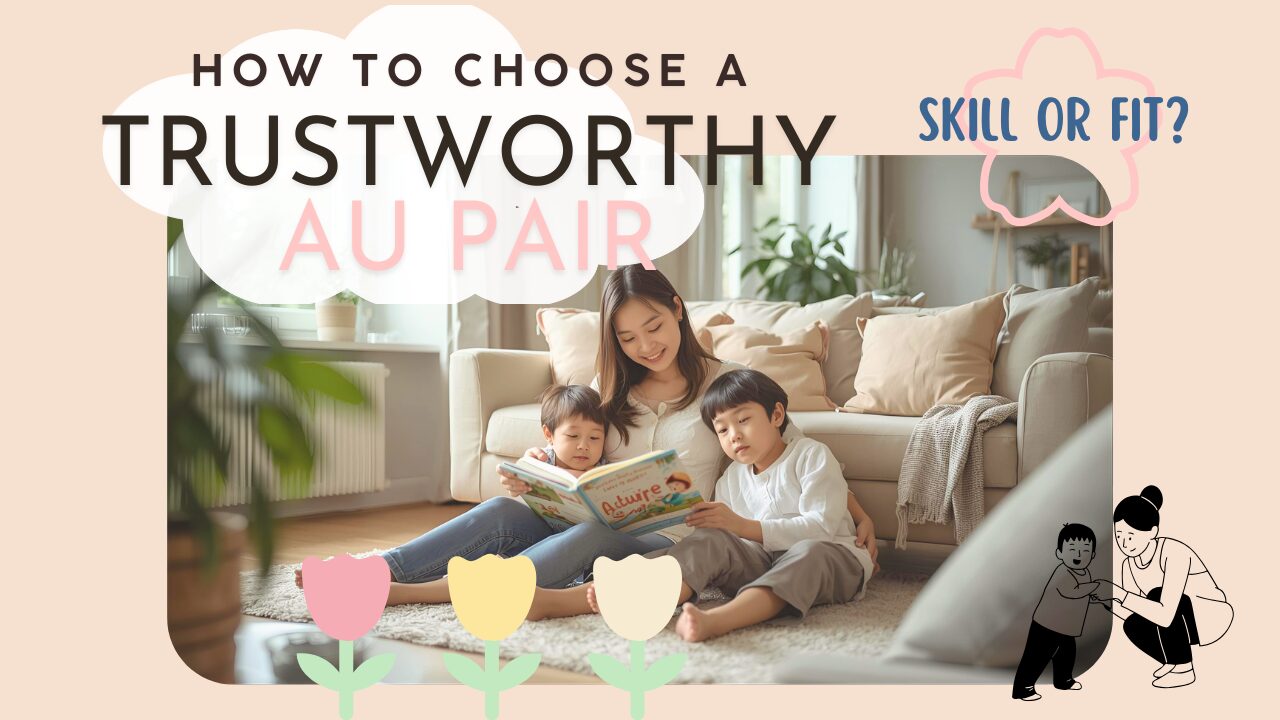How to Choose a Trustworthy Au Pair: A Guide for Thoughtful Families
When you welcome someone into your home to share in your children’s daily life, you’re not hiring a service—you’re inviting a person into your family’s rhythm, routines, and most tender moments.
This is especially true when considering a Japanese au pair through Sakura Aupairs EU. The decision requires more than a CV review or a skills checklist. It asks you to look deeper: at character, intention, and the quiet qualities that make someone not just capable, but genuinely trustworthy.
What Does “Trustworthy” Really Mean in This Context?
Trust, in the context of hosting an au pair, is layered.
It’s not only about reliability—though that matters. It’s about emotional safety. It’s knowing that the person caring for your child understands boundaries, responds with patience, and carries themselves with integrity when no one is watching.
A trustworthy au pair is someone who:
- Respects your family’s values and routines, even when they differ from her own
- Responds to your child’s emotions with sensitivity and calm
- Communicates openly when something feels unclear or difficult
- Takes responsibility seriously, without needing constant oversight
This is not the same as finding an afterschool nanny or arranging daycare. An au pair becomes part of the emotional fabric of your home. The question isn’t just “Can she do the tasks?” but “Can we trust her with our children’s hearts?”
What to Look for Beyond the Profile
1. Maturity and Self-Awareness
Look for young women who can articulate why they want this experience—not in generic terms, but with personal reflection.
A trustworthy candidate will speak about her own growth, her curiosity about your culture, and what she hopes to learn. She won’t frame the role as simply “childcare work” but as a meaningful cultural exchange.Japanese au pairs, in particular, often bring a deep sense of sekinin (責任)—personal responsibility. This cultural value shapes how they approach commitments, especially those involving children.
2. Emotional Intelligence and Patience
Watch how she responds to questions about challenges. Does she acknowledge difficulty, or does she offer only easy answers?
A young woman who can reflect on past mistakes, who understands that children have hard days, and who shows empathy in her language is more likely to navigate the complexities of family life with grace.
In Japanese culture, the concept of omoiyari (思いやり)—thoughtful consideration of others—is central to how relationships are nurtured. It’s a quality that translates beautifully into caregiving.
3. Cultural Humility
Trustworthiness also lives in how someone holds a difference.
An au pair arriving in the Netherlands or Amsterdam will encounter habits, communication styles, and family dynamics that may be unfamiliar. A trustworthy candidate is curious, not judgmental. She asks questions rather than assuming. She adapts without losing herself.
This is not about being passive. It’s about being open—and that openness is essential when she’ll be modelling behaviour for your children.
4. References and History (But Not Only That)
Of course, references matter. Speaking with past host families or educators gives you insight into consistency and reliability.
But remember: a reference tells you what someone did. A conversation tells you who someone is.
Ask about her motivations. Her fears. What she finds difficult. How she comforts herself when she’s homesick. These questions reveal character in ways a recommendation letter cannot.
The Japanese Au Pair Difference: Why Cultural Background Matters
Families who choose to host a Japanese au pair through Sakura Aupairs EU often speak about a particular quality—something harder to quantify than punctuality or organisational skill.
It’s a quiet attentiveness. A sense of care that expresses itself not in grand gestures, but in the small, daily acts: the way she arranges your child’s shoes, the gentleness in her voice during a tantrum, the way she models respect in how she moves through your home.
This isn’t about cultural stereotyping. It’s about recognising that upbringing shapes how we approach responsibility, relationships, and the care of others.
In Japan, children are taught from a young age to consider the group, to notice the needs of those around them, and to move through the world with ki o tsukeru (気を付ける)—a kind of mindful caution. These values often translate into a deeply conscientious approach to caregiving.
That said, every individual is different. A Japanese background doesn’t guarantee trustworthiness—but it often signals a foundation of values that align well with families seeking thoughtful, emotionally intelligent care.
The Role of Thoughtful Matchmaking
Finding the right au pair isn’t something families should navigate alone—and it’s not something that happens by chance.
This is where careful pre-screening and matchmaking become essential. At Sakura Aupairs EU, we approach this process as a form of care in itself: filtering candidates not just for competence, but for character, intention, and cultural alignment.
Before a family ever meets a potential au pair, we’ve already had deep conversations with her. We’ve explored her motivations, her experience with children, her emotional maturity, and her readiness for the reality of living abroad. We’ve assessed not only what she can offer, but who she is.
This initial screening creates a foundation of trust—so that when you begin your own conversations through video calls and messaging, you’re meeting someone who has already been thoughtfully considered.
The Importance of Connection Before Arrival
Video calls and messaging are not formalities. They are the beginning of the relationship.
These exchanges allow you to sense whether there’s a natural rapport. Does she respond warmly to your questions? Does she seem genuinely curious about your children’s interests, your daily rhythms, your values? Can you imagine her at your dinner table, reading bedtime stories, navigating a tantrum with patience?
Equally, it gives her the chance to feel seen—not as a worker, but as a person. She can begin to picture herself in your home, with your family. She can ask her own questions, voice her hopes and concerns, and assess whether this feels like the right fit for her, too.
This mutual choosing is what transforms a placement into a partnership.
Bridging Cultures: Training and Preparation
One of the most valuable aspects of working with Sakura Aupairs EU is what happens before your au pair even arrives in the Netherlands.
Cultural differences don’t only exist in customs or food—they live in communication styles, expectations around directness, and how emotions are expressed. What feels natural in a Japanese household may be quite different from daily life in Amsterdam or Amstelveen.
That’s why we provide comprehensive au pair training and cultural guidance. We prepare each young woman not just with practical childcare skills, but with insight into European family dynamics and communication patterns.
What This Means in Practice:
Japanese culture often values indirect communication and reading between the lines—what is left unsaid can matter as much as what is spoken. In many Dutch households, the opposite is true: clarity, directness, and open dialogue are valued.
We guide our au pairs to understand that when a host parent says, “What do you think we should do?” it’s often a genuine question, not a test. That “no” can be a complete sentence without being rude. That asking for help isn’t a sign of weakness, but of maturity.
This early preparation doesn’t erase cultural differences—nor should it. But it creates a common language, a shared understanding that allows both family and au pair to navigate moments of confusion with grace rather than frustration.
From the early stages of the stay, your au pair arrives not bewildered, but oriented. She understands that you might communicate differently than her own family does, and she has tools to bridge that gap.
Support That Continues
Equally important: our role doesn’t end at placement.
Throughout the year, we remain available for any questions, concerns, or challenges that arise. Sometimes it’s practical: how to navigate paperwork, or connect with other au pairs in the area. Sometimes it’s emotional: homesickness, cultural adjustment, or moments when communication feels difficult despite everyone’s best intentions.
This ongoing support benefits both the au pair and the family. When small issues are addressed early—with guidance from someone who understands both perspectives—they don’t become large problems. When an au pair knows she has someone to turn to, she feels less alone. When a family knows they have experienced support, they feel more confident.
It’s another layer of safety, another thread in the web of trust that allows this relationship to flourish.
Practical Steps: How to Assess Trustworthiness
During the Interview:
- Ask open-ended questions: “Tell me about a time you had to care for someone who was upset. What did you do?”
- Explore her expectations: “What do you imagine a difficult day might look like?”
- Discuss boundaries: “How do you manage your own stress? What do you need from us to feel supported?”
- Share your rhythms: Talk openly about your family’s daily life, quirks, and values
Look for These Green Flags:
- She asks thoughtful questions about your children’s personalities, routines, and needs
- She speaks about her own family and upbringing with warmth and respect
- She’s honest about what she finds challenging (e.g., “I’m still learning to cook,” rather than claiming perfection)
- She expresses genuine curiosity about life in Amstelveen, Amsterdam, or the Netherlands
- She seems emotionally present during conversations, not just polite
Red Flags to Notice:
- Vague or overly rehearsed answers
- Reluctance to discuss challenges or past difficulties
- Focus only on travel or résumé-building, rather than the children
- Lack of questions about your family
- Discomfort with open, honest conversation
Trust Is Built, Not Found
Here’s something important to hold: you cannot know everything in advance.
Trustworthiness reveals itself over time, in the everyday. It’s built through small moments—how she handles a scraped knee, how she responds when plans change, how she speaks to your child when she’s tired.
What you can do is begin with someone whose values, character, and intentions align with your own. Someone who understands that this role is not about school pick-up support or replacing daycare—it’s about being a presence in your child’s life.
With a Japanese au pair, you’re often beginning with a young woman who has been raised to value diligence, empathy, and respect. That’s not a guarantee, but it’s a strong foundation.
Creating a Safe Space: The Other Half of Trust
But here’s what many families overlook: trust is not only something you assess—it’s something you cultivate.
For an au pair to truly settle into your home and family, she needs to feel safe. Not just physically, but emotionally. She needs to know that she can ask questions when she’s unsure, that she can be homesick without judgment, that she can be herself—not perfect—and still belong.
This isn’t soft thinking. It’s practical. A young woman who feels welcomed, valued, and emotionally secure will naturally begin to blend into your family’s rhythm. She’ll feel motivated not out of obligation, but from genuine connection. She’ll notice what needs doing because she cares, not because it’s on a list.
How to Create That Safety:
In the first weeks:
- Check in daily, not to supervise, but to listen. “How are you feeling? What felt challenging today?”
- Show her around the neighbourhood—the grocery store, the tram stop, the park—so she feels oriented
- Introduce her to other au pairs or young people in Amsterdam or Amstelveen, if possible
- Make space for her to share her culture: perhaps she cooks a Japanese meal, or teaches your children a simple phrase
As she settles:
- Include her in family moments—not as staff, but as part of the constellation: a weekend walk, a board game night, a conversation over tea
- Notice her efforts, especially the quiet ones: “I saw how patient you were with Emma this afternoon. Thank you.”
- Be clear and kind when something needs adjustment. “Could we try it this way instead?” rather than criticism
- Respect her time off. She needs rest, privacy, and space to be herself outside of the family role
When challenges arise:
- Communicate openly. If something feels off, say so gently. “I’ve noticed you seem quieter lately. Is everything alright?”
- Remember that she’s learning—not just about your children, but about living in a new country, navigating a different language and culture
- Support her growth. If she’s interested in a course, a hobby, or meeting other young people, encourage it
This kind of warmth and attentiveness doesn’t just benefit the au pair. It benefits your children, who watch how you treat her and learn what kindness looks like. And it benefits you, because a young woman who feels at home in your home will naturally become the trusted, caring presence you hoped for.
When an au pair feels genuinely welcomed—not as help, but as a person—she doesn’t count tasks. She invests. She notices when your toddler is off. She folds the laundry because she knows it brings you peace. She stays up late helping your daughter with a school project because she cares.
That’s not something you can demand. It’s something that grows when trust and safety are mutual.
The Emotional Reward of Getting It Right
When you find someone truly trustworthy—someone your children run to with excitement, someone who notices when your toddler is off, someone who folds the laundry without being asked because she knows it brings you peace—the relationship becomes something more than functional.
It becomes a gift. For your children, who see a model of kindness, resilience, and cross-cultural grace. For your au pair, who grows in confidence and connection. And for you, as a parent, who gains not just support, but a window into another way of seeing the world.
That’s the heart of what Sakura Aupairs EU offers: not childcare, but connection. Not convenience, but culture. Not a service, but a person.
What qualities do you value most in someone you’d trust with your children? What questions would you ask to truly understand who they are?
We’d love to hear your reflections.
If you’re considering welcoming a Japanese au pair into your family’s life, you can learn more about how Sakura Aupairs EU approaches matchmaking, cultural preparation, and ongoing support at sakuraaupairseu.com/rates.


